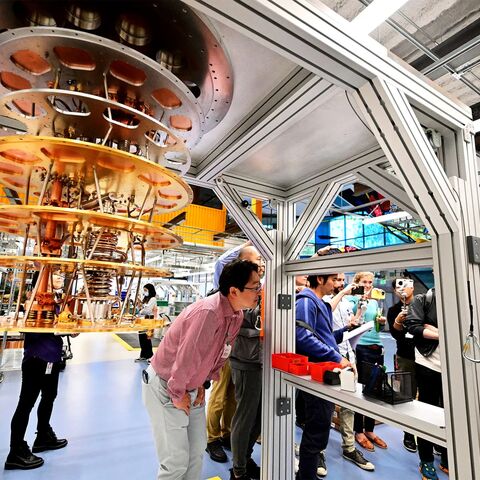News
Full listing
February 1, 2024
Christopher Parzyck had done everything right.
Parzyck, Ph.D. ’23, a postdoctoral researcher, had brought his nickelate samples – a newly discovered family of superconductors – to a synchrotron beamline for x-ray scattering experiments. He was measuring his samples, which he’d synthesized with a new method, in the hope of detecting the suspected presence of “charge ordering” – a phenomenon in which electrons self-organize into periodic patterns. The phenomenon has been linked to high-temperature superconductivity.
But there was no significant charge order in his samples. None.
January 29, 2024
“We can now, for the first time, compute theoretically, without any outside inputs or assumptions, how helium atoms deposit energy into a material when they bounce off of its surface,” said Tomás Arias, professor of physics in the College of Arts and Sciences (A&S), who directed and supervised the research.
December 21, 2023
The world’s biggest computing companies and a raft of well-funded startups all agree: The future of computing is manipulating data with quantum mechanics. Over the past decade, governments, private companies, and venture capitalists have collectively invested billions of dollars into quantum computing, which aims to solve problems using a new type of logic enabled by harnessing quantum properties such as superposition and entanglement rather than ordinary 1’s and 0’s. Yet despite some prototypes capable of elementary operations, the hardware isn’t reliable enough to be practically useful.
December 20, 2023
Thanks to a paper in 1997 by the physicist Alexei Kitaev, then at Russia’s Landau Institute for Theoretical Physics, this strange electron choreography became the blueprint for a new kind of computer.
Traditional computers rely on transistors, switches that turn electricity off and on, encoding either a 0 or a 1—a “bit” of information. Connect these switches in the right way, and the machine can run any conceivable calculation, although exceptionally complex tasks could take billions of years.
...Recently, Google engineers brought the Majorana connection a step closer to reality with the help of Cornell University theorist Eun-Ah Kim.
December 13, 2023
Team member Katja Nowak, assistant professor of physics at Cornell University, has significant experience in the characterization of superconducting materials. Their toolbox of techniques enables imaging the properties of these materials to better prepare them for large-scale application.
“My lab brings expertise in a very unique way to image relevant materials and structures,” Nowak said. “We specialize in a type of magnetic imaging at low temperatures that we typically use to detect emerging phenomena in quantum materials. But it so happens that our imaging is well suited to help develop a better understanding of the fundamentals of the materials involved in SCD electronics. This is an important requirement to pursue the type of technology we are adopting in this project.
December 13, 2023
Amid a furore of hype and criticism, James Hamlin, a physicist who conducts high-pressure experiments at the University of Florida in Gainesville, and Brad Ramshaw, a superconductivity researcher at Cornell University in Ithaca, New York, sent Nature their concerns about the research. (Nature’s news team is independent from its journals team.) The paper was retracted in November, generating headlines: it was Ranga Dias’s third retraction in little more than a year.
December 10, 2023
The "quantum spin-glass" state in quantum computing was discovered by Cornell researchers, providing information for error correction and revealing hidden orders in quantum algorithms.
When examined under the microscope, window glass displays a peculiar blend of features. Despite appearing liquid-like, its atoms exhibit the sturdiness of a solid, and any force exerted on one atom can impact all others.
A "quantum spin-glass" is a physicist's analogy for a quantum state characterized by disordered and rigid quantum mechanical bits in a quantum computer. Cornell researchers discovered this state while conducting a research project to learn about quantum algorithms and error correction methods.
The physics professor Erich Mueller reported that quantum particles have varying momentum and quantitative quantities for each other when measured. Consequently, some incompatible measurements result in the creation of a quantum spin-glass, as shown by experiments.
The study, published in Physical Review B, co-authored by physics doctoral student Vaibhav Sharma, has just been published.
A&S assistant professor Chao-Ming Jian is one of the co-authors of Mueller's research, which is conducted at Cornell's Laboratory of Atomic and Solid State Physics (LASSP). The research was supported by a College of Arts and Sciences New Frontier Grant.
December 8, 2023
“Anterior forebrain pathway in parrots is necessary for producing vocalization with individual signatures” published in Current Biology on Dec. 8 with Zhao as first author. Co-authors from the Department of Neurobiology and Behavior (A&S) are: Jesse H. Goldberg, associate professor of neurobiology and behavior and Robert R. Capranica Fellow; research specialists Julie Carpenter and Brian Kardon; and undergraduate researcher Frieda Nemon. Co-authors from the Department of Physics (A&S) are Itai Cohen, professor of physics; and doctoral student Han Kheng Teoh.
November 3, 2023
The Physics Department at Cornell University invites applications for a tenure-track faculty position at the associate or full professor level in research areas relating to quantum physics, beginning July 1, 2024 at the earliest. Relevant areas include (but are not limited to) quantum information processing and communication, cold atoms and molecules, quantum materials, quantum devices and sensing, in either theory or experiment.
October 24, 2023
Eric D. Siggia received the Max Delbrück Prize in Biological Physics, which recognizes outstanding achievement in biological physics research.
He earned the prize for powerful theoretical approaches to the physics of life and incisive connections between theory and experiment, from the mechanics of DNA to the dynamics of genetic networks, and from noise in gene expression to pattern formation in embryos and populations of stem cells.
Siggia is the Viola Ward Brinning and Elbert Calhoun Brinning Professor at Rockefeller University in New York.










